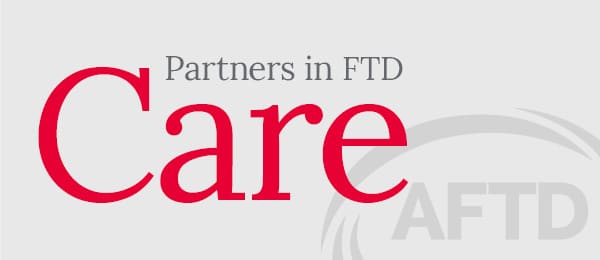From a Caregiver’s Perspective: The Importance of Speech and Language Therapy in PPA

Partners in FTD Care, Fall 2020
Download the full issue (pdf)
by Barb Murphy
For people living with PPA, speech and language therapy can help slow the decline of language ability and compensate for losses over time. For my husband Gary, diagnosed with PPA five years ago, speech and language therapy has had a tremendous impact. Our decision to participate in Northwestern University’s Communication Bridge Clinical Trial gave him critical word-finding and language retention skills and helped to boost his confidence when communicating.
An internet-based, speech and language therapy intervention, the Communication Bridge Clinical Trial seeks to evaluate the effectiveness of various therapies for adults with mild PPA by applying evidence-based language interventions. The 12-month program was a positive and rewarding experience, providing daily exercises to improve Gary’s language abilities, as well as invaluable weekly one-on-one sessions with a trained speech-language pathologist.
Gary initially put up a fight—he said the disease was just going to worsen and nothing could change that. But eventually he agreed to participate in the program, and he’s glad he did. The program’s person-centered approach encourages speech-language pathologists to meet persons diagnosed at their current skill set and work towards communication goals most important to them. When we started, Gary and I were told to list words that we felt were important for him to retain, and to practice those words daily. He even practiced on vacation! Now, six months since our final session, Gary is still able to recall all but the eight most difficult words on that list.
In addition to the language exercises, I found that working with a speech-language pathologist also helped me to both better understand PPA and find ways to advance Gary’s treatment. The entire team we worked with, in fact, was dedicated, patient, and encouraging. They taught my husband countless ways to search for words—skills that still help him today, almost five years since his diagnosis.
While my own participation in the program was limited— I was the cheerleader behind my husband, encouraging him when he needed it—I enjoyed seeing his dedication to practicing each day. The program’s structure allowed him to track his progress, which motivated him. The skills he learned gave him the confidence to pick up the phone and call his buddies and sons for the first time since his diagnosis. For that, we are very grateful.
We have set two goals for our PPA journey: to retain for as long as possible Gary’s speech and word finding—in whatever form they take; and to help others facing PPA who could benefit from this type of program. We do feel the program was helpful in our journey, and if our participation can advance research and help Gary retain those 75 words, then I am especially glad we participated.
To learn more about participating in the Communication Bridge Clinical Trial, please visit the Featured Studies section at theaftd.org.
See also:
- When the Conversation Stops: Logopenic Variant Primary Progressive Aphasia
- Ask an Expert: Is Logopenic PPA an FTD Disorder or Alzheimer’s Disease?
- PPA and Depression
- PPA Subtyping: Helping or Hindering the Understanding of PPA?
- From a Caregiver’s Perspective: Music Therapy and Language Retention
- What to Do About… Managing Logopenic Variant PPA
- Download the full issue (pdf)
By Category
Our Newsletters
Stay Informed
Sign up now and stay on top of the latest with our newsletter, event alerts, and more…
